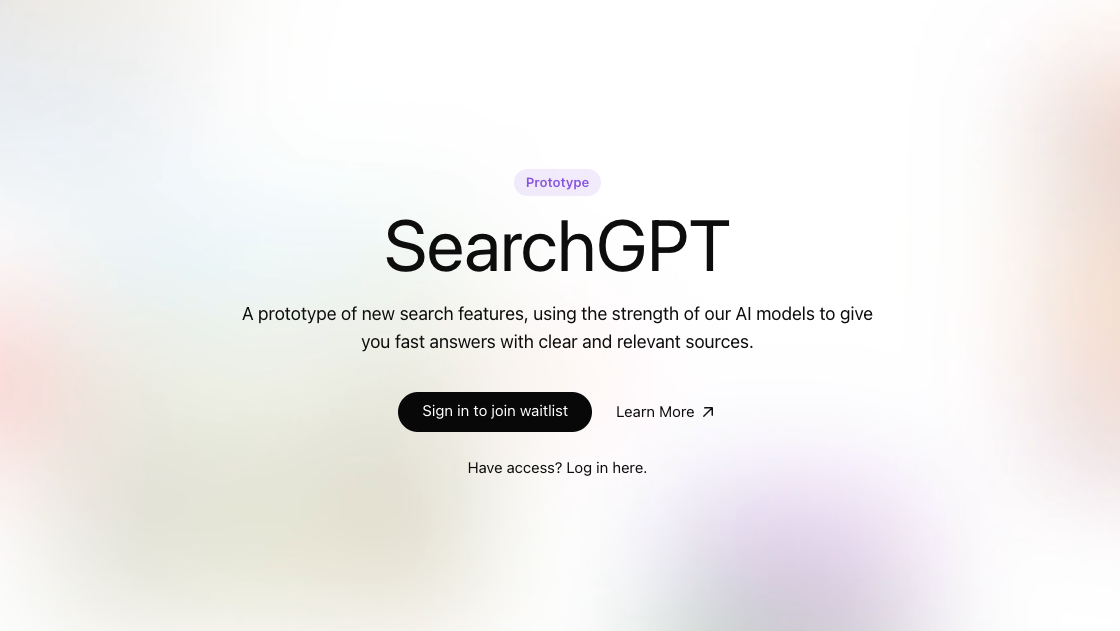
OpenAI has unveiled SearchGPT, an AI-powered search engine prototype aimed at delivering timely answers by sourcing information from the web. The launch positions OpenAI as a potential competitor to established search giants like Google and Bing, as well as emerging players like Perplexity.
The prototype is currently available to a small group of users and publishers, with a waitlist open for additional participants.
How Does SearchGPT Work?
SearchGPT’s user interface closely resembles that of OpenAI’s ChatGPT platform. Users can type in queries and receive responses that include both information and photos, along with links to relevant sources. The platform also allows for follow-up questions and the exploration of related searches through a sidebar.
Notably, some searches consider the user’s location to enhance result accuracy, such as providing a list of nearby restaurants or local weather forecasts. Users can choose to share precise location information via a toggle in the settings menu, although general location data is shared with third-party search providers to improve result relevance.
What Powers SearchGPT’s Technology?
The prototype utilizes OpenAI’s advanced models, including GPT-3.5, GPT-4, and GPT-4o, and aims to integrate some features into ChatGPT in the future.
In a blog post, OpenAI emphasized the potential for SearchGPT to streamline the search process by leveraging real-time web information to deliver quick and accurate responses. The company stated, “Getting answers on the web can take a lot of effort, often requiring multiple attempts to get relevant results. We believe that by enhancing the conversational capabilities of our models with real-time information from the web, finding what you’re looking for can be faster and easier.”
Debut on a Less Than Ideal Timing
The launch of SearchGPT comes at a time when AI-powered search tools are under scrutiny for issues such as plagiarism, inaccuracies, and content cannibalism. Competitors like Google’s AI Overviews, The Browser Company’s Arc Search, and Genspark have faced criticism for providing misleading or inappropriate information.
Additionally, Perplexity has been accused of repurposing content from major outlets like CNBC, Bloomberg, and Forbes without proper attribution, which has raised concerns about the impact of AI-generated summaries on publisher traffic.
Ensuring Responsible Use of SearchGPT
In response to these industry challenges, OpenAI has sought to differentiate SearchGPT by positioning it as a more responsible and measured deployment. The company has highlighted its commitment to transparency and collaboration with publishers, stating that SearchGPT will “prominently cite and link” to sources with “clear, in-line, named attribution.” OpenAI is also working with publishers to design the search experience and offering website owners control over how their content appears in search results.
The company clarified that content featured in SearchGPT will not be used for training its generative AI foundation models, ensuring that sites can still appear in search results even if they opt out of such training.
However, some users have already reported inaccuracies in the information presented by SearchGPT. Addressing these concerns will be crucial for the prototype’s future, as the company seeks to maintain a “thriving ecosystem of publishers and creators.”
OpenAI’s responsible approach comes amid past controversies, such as using millions of YouTube transcripts for model training without permission. The future of SearchGPT will depend on its ability to navigate these challenges and provide a reliable and ethical search experience.
Featured Image courtesy of screenshot from SearchGPT.
Follow us for more news on OpenAI.
